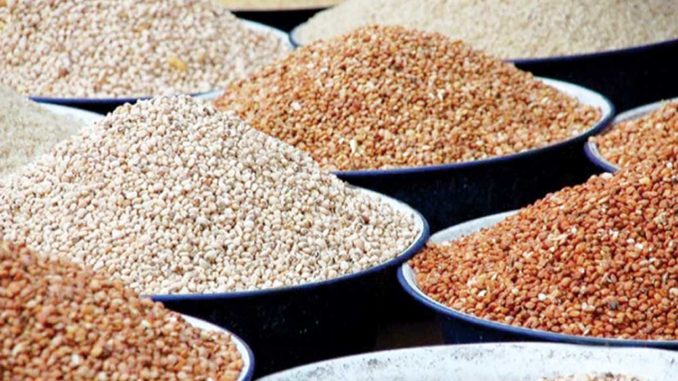
“Healthy citizens are the greatest asset any country can have.”
Winston Churchill (1874 – 1965), Former British Prime Minister
Few weeks ago, the media was awash with video clips showing some food vendors or traders spraying sniper, a lethal chemical, on beans in order to preserve the product. This triggered public outcry and raised fears among many Nigerians who can’t do without beans.
Taking a swift action to douse and allay the fears of everyone, some concerned government agencies, private institutions and individuals issued press statements and public alerts on the toxic effects of consuming sniper-treated beans. Sniper is a pesticide used for pest control and preservation of stored agricultural commodities.
The World Safety Organisation (WSO) says sniper is a poisonous pesticide that can kill instantly, and it is not supposed to be sprayed on food as it can cause respiratory paralyses, kidney disease and death.
The fatal consequences of consuming foods treated with sniper and other harmful chemicals are gastro-intestinal health issues, brain and other internal tissues damage, blood and food poisoning, and death.
One of the government agencies, National Agency for Food and Drug Administration and control (NAFDAC), saddled with the responsibility of safeguarding the health of the nation, through its Director General, Prof Christiana Adeyeye, recently issued a public alert in reaction to the dangerous practice of wrong application of agrochemicals, such as sniper, for storage and preservation of agricultural commodities by unauthorized and untrained persons.
She said in the press statement, “Agrochemical should be properly applied with caution and good understanding such that they do not come in contact with the agricultural commodity.
This is to prevent contamination of such food products, which could constitute danger to public health.”
Prof Adeyeye added, “Ingestion of food contaminated by such agrochemicals can result in severe health conditions such as skin irritation, blindness, seizures, vomiting, diarrhoea, cancer, and at higher concentrations, convulsions, coma and even death.”
She therefore advised the general public that beans or grains suspected to have traces of agrochemical in it should neither be bought nor consumed.
How then do we identify beans treated with sniper? Difficulty may arise in knowing this at the point of purchase because no one can tell which beans is contaminated by mere visual inspection.
However, a Crop Protection Specialist, Dr. Rotimi Akinlesi provides a practical approach to answer the question above.
According to Dr. Akinlesi, the following steps should be taken to identify grains preserved with agrochemicals: first, pour the beans in a bowl or bucket of water.
Secondly, stir for about 20 seconds. If there is an oily film on the water, then note that the beans have chemicals sprayed on them and must not be consumed.
He also said that the presence of one or two weevils in the beans also shows that it is not preserved with chemicals.
He further advised that thorough washing of grains in several rinses of water before cooking is safer than just cooking without washing.
It has also been reported that, apart from beans, farmers also use some poisonous chemicals to preserve dry fish, maize and other cereals.
This obviously shows that these farmers lack relevant knowledge on the best harmless ways to preserve food.
It therefore brings to the fore the urgent need for Ministries of Agriculture and Health and other concerned authorities to regulate indiscriminate use of chemicals in the preservation of farm produce in the country.
This indiscriminate use of agrochemicals to preserve food breeds unwholesome food products and gives rise to self-poisoning.
While we commend NAFDAC, Consumer Protection Council (CPC) and other concerned agencies for swiftly taking some steps to curb the circulation of the contaminated beans when the news broke, it is important we also laud the Standards Organisation of Nigeria (SON).
In order to forestall future occurrence of grains contamination with agrochemicals, SON issued standards and codes of practice for beans and other grains from planting to the consumption table.
Apart from the enforcement of these codes, farmers and grains merchants must be well informed on the methodology to preserve grains and other farm produce without endangering consumers’ health.
We also implore all relevant government agencies to create awareness through enlightenment campaigns and dissemination of information on the correct usage, method of application, management and control and importation of these chemicals.
There should also be strict monitoring of methods employed by farmers in the storage, distribution and transportation of these farm produce, particularly in rural areas.
The time is due for government to fully equip NAFDAC so that it can evolve mechanisms to ensure restricted and controlled use of sniper for food preservation among farmers, grains merchants, retailers and distributors.
This way, the risk of food contamination with sniper can be totally avoided.
• Ojewale writes from Idimu, Lagos via kayodeojewale@gmail.com
END

Be the first to comment